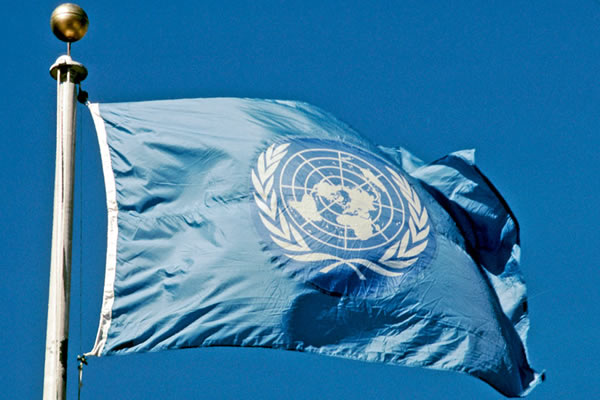United Nations
UN Security Council meeting to focus on LGBTQ, intersex rights
Activists from Colombia, Afghanistan expected to speak at March 20 gathering

A meeting that will focus on the integration of LGBTQ and intersex rights into the U.N. Security Council’s work will take place at the United Nations on March 20.
The U.S. Mission to the U.N. is co-sponsoring the meeting along with Albania, Brazil, Cyprus, the Czech Republic, France, Greece, Japan, Malta, Switzerland, the U.K. and the LGBTI Core Group, a group of U.N. countries that have pledged to support LGBTQ and intersex rights.
U.S. Ambassador to the U.N. Linda Thomas-Greenfield will convene the meeting.
Victor Madrigal-Borloz, the independent U.N. expert on LGBTQ and intersex issues, is expected to provide a briefing on LGBTQ and intersex rights around the world. María Susana Peralta of Colombia Diversa — an LGBTQ and intersex advocacy group in Colombia that participated in talks between the country’s government and the Revolutionary Armed Forces of Colombia that led to an LGBTQ-inclusive peace agreement then-President Juan Manuel Santos and then-FARC Commander Rodrigo “Timochenko” Londoño signed in 2016 — and Afghan LGBT Organization Director Artemis Akbary are also expected to take part.
“At this meeting, we are asking countries to make specific commitments to address LGBTI human rights concerns in the Security Council,” a senior administration official on Thursday told reporters during a conference call. “So, for example, we ourselves will commit to ask questions of U.N. officials regarding human rights violations of LGBTQI persons. We will also commit to raise in our national statements at the Security Council any reports or abuses or other concerns unique to the LGBTI community, and when appropriate, we’ll propose language in Security Council resolutions where there are egregious violations.”
“Our view is that we need to build on best practices,” said another senior administration official. “And we need to embrace a midset in the Security Council where, as the Council addresses the crisis of the day, members consistently ask relevant questions such as: What can the Security Council do to increase protection for LGBTQI+ persons in this conflict? Or how can we expand the women, peace and security agenda to include intersectional identities? Or have we included the perspectives of LGBTQI+ persons in a peacekeeping mission or in a peacebuilding process?”

The Security Council’s first-ever LGBTQ-specific meeting, which focused on the Islanmic State’s persecution of LGBTQ Syrians and Iraqis, took place in 2015. Then-U.S. Ambassador to the U.N. Samantha Power, who is now director of the U.S. Agency for International Development, and then-International Gay and Lesbian Human Rights Commission Executive Director Jessica Stern, who is now the special U.S. envoy for the promotion of LGBTQ and intersex rights, are among those who participated.
The Security Council in June 2016 formally condemned the Pulse nightclub in Orlando, Fla. The U.N. Human Rights Council a few months later appointed Vitit Muntarbhorn as the first independent U.N. expert on LGBTQ and intersex issues. (Madrigal-Borloz succeeded Muntarbhorn in 2018.)
Then-U.S. Ambassador to the U.N. Kelly Knight Craft and then-U.S. Ambassador to Germany Richard Grenell in 2019 hosted an event on the sidelines of a U.N. General Assembly meeting that focused on efforts to decriminalize consensual same-sex sexual relations around the world.
President Joe Biden in 2021 signed a memo that committed the U.S. to promoting LGBTQ and intersex rights abroad as part of the Biden-Harris administration’s overall foreign policy. Outgoing State Department spokesperson Ned Price later told the Washington Blade the decriminalization of consensual same-sex sexual relations is one of the White House’s five priorities as it relates to the promotion of LGBTQ and intersex rights overseas.
Russia one of five permanent Security Council members
The U.S., the U.K., France, China and Russia are the Security Council’s five permanent members. Albania, Brazil, Ecuador, Gabon, Ghana, Japan, Malta, Mozambique, Switzerland and the United Arab Emirates are the 10 non-permanent members.
The United Arab Emirates and Ghana is among the dozens of countries in which consensual same-sex sexual relations remain criminalized.
Gabon and Mozambique over the last decade have formally decriminalized homosexuality. in 2020.
A Ghanaian lawmaker in 2021 introduced a bill that seeks to criminalize LGBTQ and intersex identity and allyship in the country. Russian President Vladimir Putin late last year signed another so-called propaganda law that specifically targets LGBTQ and intersex people.
Russia on Feb. 24, 2022, launched its war against Ukraine.
One of the two senior administration officials who spoke with reporters on Thursday said they do not know if Russia will participate in the meeting. The other official added it is “impossible to have a conversation about the vulnerabilities of LGBTQI people without looking at what’s been happening in Ukraine.”
“I’m sure that’s going to be a question that people are asking,” they said. “I can imagine that it might be referenced in some of the statements by other missions.”
Editor’s note: International News Editor Michael K. Lavers will be at the U.N. on March 20 to cover the meeting.
Congress
Mike Waltz confirmed as next UN ambassador
Trump nominated former national security advisor in May

The U.S. Senate on Sept. 19 confirmed former U.S. Rep. Mike Waltz (R-Fla.) as the next U.S. ambassador to the U.N.
The Florida Republican had been the national security advisor until President Donald Trump in May tapped him after U.S. Rep. Elise Stefanik (R-N.Y.) withdrew her nomination in order to ensure Republicans maintained their narrow majority in the U.S. House of Representatives.
Senators approved Waltz’s nomination by a 47-43 vote margin.
“Thank you President Trump and the U.S. Senate for your trust and confidence to Make the UN Great Again,” said Waltz on X.
The U.N. General Assembly is taking place this week in New York. Trump is scheduled to speak on Tuesday.
United Nations
UN Human Rights Council extends LGBTQ rights expert’s mandate
29 countries voted for resolution

The U.N. Human Rights Council on Monday extended the mandate of the United Nations’ independent LGBTQ rights expert for another three years.
The resolution passed with 29 countries (Albania, Belgium, Bolivia, Brazil, Bulgaria, Chile, Colombia, Costa Rica, Cuba, Cyprus, the Czech Republic, the Dominican Republic, France, Georgia, Germany, Iceland, Japan, Kenya, the Marshall Islands, Mexico, the Netherlands, North Macedonia, South Korea, Romania, South Africa, Spain, Switzerland, Thailand, and Vietnam) voting for it and 15 countries (Algeria, Bangladesh, Burundi, China, Cote d’Ivoire, Democratic Republic of Congo, Ethiopia, Gambia, Indonesia, Kuwait, Malawi, Maldives, Morocco, Qatar, and Sudan) voted against it.
Benin, Ghana, and Kyrgyzstan abstained.
The U.S. in February withdrew from the Human Rights Council. The Trump-Pence administration in 2018 pulled the U.S. from it. The U.S. in 2021 regained a seat on the Human Rights Council.
Graeme Reid has been the UN’s independent LGBTQ rights expert since 2023. The South African activist, among other things, previously ran Human Rights Watch’s LGBT Rights Program.
United Nations
Trump pulls Elise Stefanik’s UN ambassador nomination
Republicans have slim majority in US House of Representatives

President Donald Trump on Thursday withdrew U.S. Rep. Elise Stefanik (R-N.Y.)’s nomination to become the next U.S. ambassador to the U.N.
The Associated Press noted Trump in a Truth Social post said it was “essential to maintain every Republican seat in Congress.”
Republicans currently have a narrow 218-213 majority in the U.S. House of Representatives. Special elections to fill the seats that National Security Adviser Mike Waltz and former U.S. Rep. Matt Gaetz (R-Fla.) vacated when they joined the Trump-Vance administration and resigned respectively will take place on April 1 in Florida.
“Elise Stefanik is truly a great leader and a devoted patriot,” said House Speaker Mike Johnson (R-La.) in a statement. “Today’s selfless decision shows America what those of us who work with her already know. She is deeply devoted to her country and fully committed to see President Trump’s agenda succeed in Congress.”
“It is well known Republicans have a razor-thin House majority, and Elise’s agreement to withdraw her nomination will allow us to keep one of the toughest, most resolute members of our conference in place to help drive forward President Trump’s America First policies,” he added. “There is no doubt she would have served with distinction as our ambassador to the United Nations, but we are grateful for her willingness to sacrifice that position and remain in Congress to help us save the country.”
Stefanik, 40, has represented New York’s 21st Congressional District since 2015. She later became chair of the House Republican Conference.
Stefanik in 2019 voted for the Equality Act, but she opposed it in 2021. Stefanik in 2022 is among the dozens of Republicans who voted for the Respect for Marriage Act that then-President Joe Biden signed.
Stefanik, among other things, has also been outspoken against antisemitism on college campuses.
Trump has not said who he will nominate to become U.N. ambassador. Johnson in his statement said he will “invite her to return to the leadership table” of the House Republican Conference “immediately.”
-

 Virginia4 days ago
Virginia4 days agoMcPike wins special election for Va. House of Delegates
-

 New York5 days ago
New York5 days agoN.Y. lawmaker vows ‘Pride flag will fly again’ at Stonewall Monument
-

 District of Columbia5 days ago
District of Columbia5 days agoU.S. Attorney’s Office drops hate crime charge in anti-gay assault
-

 a&e features5 days ago
a&e features5 days agoMeet D.C.’s Most Eligible Queer Singles




















